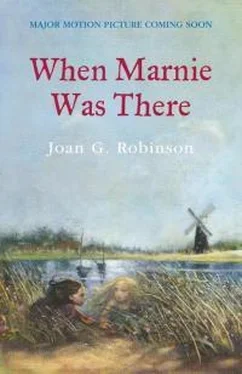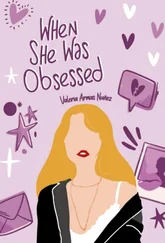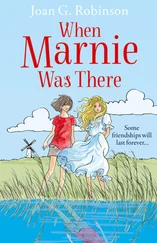Джоан Робинсон - When Marnie Was There
Здесь есть возможность читать онлайн «Джоан Робинсон - When Marnie Was There» — ознакомительный отрывок электронной книги совершенно бесплатно, а после прочтения отрывка купить полную версию. В некоторых случаях можно слушать аудио, скачать через торрент в формате fb2 и присутствует краткое содержание. Год выпуска: 2014, Издательство: HarperCollins Publishers, Жанр: Старинная литература, на английском языке. Описание произведения, (предисловие) а так же отзывы посетителей доступны на портале библиотеки ЛибКат.
- Название:When Marnie Was There
- Автор:
- Издательство:HarperCollins Publishers
- Жанр:
- Год:2014
- ISBN:нет данных
- Рейтинг книги:5 / 5. Голосов: 1
-
Избранное:Добавить в избранное
- Отзывы:
-
Ваша оценка:
- 100
- 1
- 2
- 3
- 4
- 5
When Marnie Was There: краткое содержание, описание и аннотация
Предлагаем к чтению аннотацию, описание, краткое содержание или предисловие (зависит от того, что написал сам автор книги «When Marnie Was There»). Если вы не нашли необходимую информацию о книге — напишите в комментариях, мы постараемся отыскать её.
When Marnie Was There — читать онлайн ознакомительный отрывок
Ниже представлен текст книги, разбитый по страницам. Система сохранения места последней прочитанной страницы, позволяет с удобством читать онлайн бесплатно книгу «When Marnie Was There», без необходимости каждый раз заново искать на чём Вы остановились. Поставьте закладку, и сможете в любой момент перейти на страницу, на которой закончили чтение.
Интервал:
Закладка:

C
ONTENTS
Cover
Title Page
1. Anna
2. The Peggs
3. On the Staithe
4. The Old House
5. Anna Follows Her Fancy
6. “A Stiff, Plain Thing—”
7. “—and a Fat Pig”
8. Mrs Pegg’s Bingo Night
9. A Girl and a Boat
10. Pickled Samphire
11. Three Questions Each
12. Mrs Pegg Breaks Her Teapot
13. The Beggar Girl
14. After the Party
15. “Look Out for Me Again!”
16. Mushrooms and Secrets
17. The Luckiest Girl in the World
18. After Edward Came
19. The Windmill
20. Friends No More
21. Marnie in the Window
22. The Other Side of the House
23. The Chase
24. Caught!
25. The Lindsays
26. Scilla’s Secret
27. How Scilla Knew
28. The Book
29. Talking About Boats
30. A Letter from Mrs Preston
31. Mrs Preston Goes Out to Tea
32. A Confession
33. Miss Penelope Gill
34. Gillie Tells a Story
35. Whose Fault Was It?
36. The End of the Story
37. Goodbye to Wuntermenny
Postscript by Deborah Sheppard
Keep Reading
About the Author
Copyright
About the Publisher

Chapter One
A
NNA
MRS PRESTON, WITH her usual worried look, straightened Anna’s hat.
“Be a good girl,” she said. “Have a nice time and – and – well, come back nice and brown and happy.” She put an arm round her and kissed her goodbye, trying to make her feel warm and safe and wanted.
But Anna could feel she was trying and wished she would not. It made a barrier between them so that it was impossible for her to say goodbye naturally, with the spontaneous hug and kiss that other children managed so easily, and that Mrs Preston would so much have liked. Instead she could only stand there stiffly by the open door of the carriage, with her case in her hand, hoping she looked ordinary and wishing the train would go.
Mrs Preston, seeing Anna’s ‘ordinary’ look – which in her own mind she thought of as her ‘wooden face’ – sighed and turned her attention to more practical things.
“You’ve got your big case on the rack and your comic’s in your mac pocket.” She fumbled in her handbag. “Here you are, dear. Some chocolate for the journey and a packet of paper hankies to wipe your mouth after.”
A whistle blew and a porter began slamming the carriage doors. Mrs Preston poked Anna gently in the back. “Better get in, dear. You’re just off.” And then, as Anna scrambled up with a mumbled, “Don’t push!” and stood looking down, still unsmiling, from the carriage window – “Give my love to Mrs Pegg and Sam and tell them I’ll hope to get down before very long – if I can get a day excursion, that is—” The train began moving imperceptibly along the platform and Mrs Preston began gabbling – “Send me a card when you get there. Remember they’re meeting you at Heacham. Don’t forget to look out for them. And don’t forget to change at King’s Lynn, you can’t go wrong. There’s a stamped card already addressed in the inner pocket of your case. Just to say you’ve arrived safely – you know. Goodbye, dear, be a good girl.”
Then, as she began running and looking suddenly pathetic, almost beseeching, something softened inside Anna just in time. She leaned out of the window and shouted, “Goodbye, Auntie. Thank you for the chocolate. Goodbye!”
She just had time to see Mrs Preston’s worried look change to a smile at hearing the unaccustomed use of the name “Auntie”, then the train gathered speed and a bend in the line hid her from view.
Anna sat down without looking round, broke off four squares of chocolate, put the rest of the bar in her pocket with the packet of paper handkerchiefs, and opened her comic. Two hours – more than two hours – to King’s Lynn. With luck, if she just looked ‘ordinary’ no-one would speak to her in all that time. She could read her comic and then stare out of the window, thinking about nothing.
Anna spent a great deal of her time thinking about nothing these days. In fact it was partly because of her habit of thinking about nothing that she was travelling up to Norfolk now, to stay with Mr and Mrs Pegg. That – and other things. The other things were difficult to explain, they were so vague and indeterminate. There was the business of not having best friends at school like all the others, not particularly wanting to ask anyone home to tea, and not particularly caring that no-one asked her.
Mrs Preston just would not believe that Anna did not mind. She was always saying things like, “There now, what a shame! Do you mean to say they’ve all gone off to the ice rink and never asked you?” (Or the cinema, or the Zoo, or the nature ramble, or the treasure hunt.) – And, “Why don’t you ask next time? Let them know you’d like to go too. Say something like,’ If you’ve room for an extra one, how about me? I’d love to come.’ If you don’t look interested nobody’ll know you are.”
But Anna was not interested. Not any more. She knew perfectly well – though she could never have explained it to Mrs Preston – that things like parties and best friends and going to tea with people were fine for everyone else, because everyone else was ‘inside’ – inside some sort of invisible magic circle. But Anna herself was outside. And so these things had nothing to do with her. It was as simple as that.
Then there was not-even-trying. That was another thing. Anna always thought of not-even-trying as if it were one long word, she had heard it said so often during the last six months. Miss Davison, her form teacher, said it at school, “Anna, you’re not-even-trying.” It was written on her report at the end of term. And Mrs Preston said it at home.
“It isn’t as if there’s anything wrong with you,” she would say. “I mean you’re not handicapped in any way and I’m sure you’re just as clever as any of the others. But this not-even-trying is going to spoil your whole future.” And when anyone asked about Anna, which school she would be going to later on, and so on, she would say, “I really don’t know. I’m afraid she’s not-even-trying. It’s going to be difficult to know quite what to do with her.”
Anna herself did not mind. As with the other things, she was not worried at all. But everyone else seemed worried. First Mrs Preston, then Miss Davison, and then Dr Brown who was called in when she had asthma and couldn’t go to school for nearly two weeks.
“I hear you’ve been worried about school,” Dr Brown had remarked with a kindly twinkle in his eye.
“ I’m not. She is,” Anna had mumbled.
“A-ah!” Dr Brown had walked about the bedroom, picking things up and examining them closely, then putting them down again. “And you feel sick before Arithmetic?”
“Sometimes.”
“A-ah!” Dr Brown placed a small china pig carefully back on the mantelpiece and stared earnestly into its painted black eyes. “I think you are worried, you know,” he murmured. Anna was silent. “Aren’t you?” He turned round to face her again.
“I thought you were talking to the pig,” she said.
Dr Brown had almost smiled then, but Anna had continued to look severe, so he went on seriously. “I think perhaps you are worried, and I’ll tell you why. I think you’re worried because your—” He broke off and came towards her again. “What do you call her?”
Читать дальшеИнтервал:
Закладка:
Похожие книги на «When Marnie Was There»
Представляем Вашему вниманию похожие книги на «When Marnie Was There» списком для выбора. Мы отобрали схожую по названию и смыслу литературу в надежде предоставить читателям больше вариантов отыскать новые, интересные, ещё непрочитанные произведения.
Обсуждение, отзывы о книге «When Marnie Was There» и просто собственные мнения читателей. Оставьте ваши комментарии, напишите, что Вы думаете о произведении, его смысле или главных героях. Укажите что конкретно понравилось, а что нет, и почему Вы так считаете.












